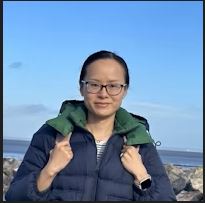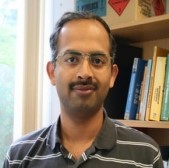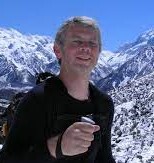Lu’s research focuses on simulating and assessing extreme hydrometeorological events like floods and heat waves, particularly in relation to climate change. Lu employs satellite remote sensing, environmental modelling, and machine learning to analyse urban and watershed contexts.
Prakash Kripakaran
Prakash is academic lead for the civil and structures research group at Exeter. His research interests are broadly in the design and management of civil infrastructures, such as bridges. He has significant experience in: the experimental and numerical modelling of flow and scour (erosion) around hydraulic structures such as bridge piers; the use of applied computing techniques including Building Information Modelling (BIM) for construction automation and design; the development of finite element modelling-based and data-driven strategies for interpreting measurements from bridge structural health monitoring; and the application of optimization methods for structural design problems (e.g. design of trusses and moment-resisting steel frames).
Peter Melville-Shreeve
Dr Peter Melville-Shreeve has worked in consultancy, startups and academic roles over the last decade. He works closely with the Chartered Institution of Water and Environmental Management’s (CIWEM’s) policy team to support sustainable water management systems and chair’s CIWEM’s Water Reuse Task & Finishing Group. Much of Peter’s early research focusses on rainwater management systems and the need for dual purpose designs – which can mitigate droughts and floods. His thesis highlighted the opportunities for Internet of Things technologies to be harnessed to reduce water demand AND manage stormwater flood risk. He consequently founded and exited a technology business which developed analytics and control systems to enable such technologies to be implemented at a range of scales.
Laurence Hawker
Laurence’s research interests focus on hydrodynamic models, elevation data, geostatistics and remote sensing. His research focuses on data-sparse areas, with current projects including FLICH: Floods and livelihoods in the Central Highlands of Vietnam, HyFLOOD: Developing Next Generation Hydrodynamic Models in Africa, as well as supporting disaster response to recent tropical storms in Central America and South-East Africa.
Shams Rahman
I am a hydrologist interested in groundwater dynamics, surface water-groundwater interactions, and the influence of groundwater dynamics on land surface and lower atmospheric processes.
Gemma coxon
I am a Lecturer in Hydrology within the Hydrology Group in the School of Geographical Sciences. My research focusses on understanding and predicting hydro-climatic extremes (floods and droughts) in changing environments. My expertise centres on building, applying and evaluating hydrological models for the improved simulation of water systems from local to continental scales across large samples of catchments.
ilya maclean
Ilya is an applied ecologist interested in climate-vegetation interactions at the scales relevant to management and decision-making. He has expertise in microclimatology, remote-sensing and fine-scale hydrological modelling.
Guangtao Fu
Guangtao’s research is focused on developing and applying new computer models, data analytics and artificial intelligence tools to tackle urban water challenges in water supply resilience, network leakage, flood risk, urban stormwater and wastewater management.
Raziyeh Farmani
Raziyeh specialises in urban water systems modelling, water resources management and asset management and has expertise in multi-objective optimisation of water networks. Her research interests covers evolutionary optimisation, artificial intelligence and data mining.
Ross Woods
Ross’s research interests cover topics including hydrology, water resources, hazards and hydroclimatology.
Rafael Rosolem
Rafael is an ecohydrometeorologist with an interest in understanding the processes and interactions that happen in the soil-vegetation-atmosphere domain, in particular how soil moisture and evapotranspiration are interconnected. He combines hydrological and land models with field experiments available from different regions facing environmental pressures such as droughts and deforestation. His current interests include improving predictions of extreme hydrometeorological events in developing countries (Africa and South America) where data availability is limited.
Slobodan Djordjevic
Slobodan researches the development and application of advanced methodologies and software tools for water management. These include: drainage and floods simulation, impacts of flooding, effects on human health and impacts on road transportation, resilience to diverse extreme weather events in the context of climate change, tidal energy extraction, water quality modelling, river and coastal engineering, water-food-energy nexus, cascading effects between water, waste, energy, transportation and other infrastructure systems, nature-based solutions, and drought risk management.
Albert Chen
Albert’s research focuses on water and human environment systems. Particular focus is on: hydraulic modelling, urban drainage, flood forecasting, innovation technology applications, water-food-energy-ecosystems nexus, climate change impact on critical infrastructure, prediction of water-borne disease, hazard impact and cascading effects assessment, and mitigation and resilience strategies.
Michael Singer
Michael’s research covers ecohydrology; drought and water scarcity; forest health; stochastic hydrology; climate change; floods; Sediment transport; hydrology and geomorphology.
Liz Holcombe
Liz has a research background in dynamic slope hydrology and stability modelling with a particular focus on urban landslide risk management in the Humid Tropics. Her wider research interests include decision-making in uncertain environments, ‘building back better’ for resilience and sustainability, and community-based approaches.
Charlotte Lloyd
Charlotte’s research is driven by a passion to address key questions surrounding the origins and fate of human and agricultural wastes in terrestrial systems, particularly in relation to their delivery from land to water bodies. Her work spans a wide variety of scales ranging from chemical, physical and biological processes ultimately integrated to the catchment level.
Her approach is to use cutting-edge analytical techniques, including molecular scale chemistry to trace hydrological and sediment pathways and to enhance understanding of the transport of organic nutrients and anthropogenic organic compounds in the environment. To date work has focussed on the impact of inputs from agriculture, such as fertilisers and other human contributions, including sewage treatment works. She uses both laboratory experimentation and field data collection and data modelling techniques, as this offers unique opportunities for exploring the impacts of various agricultural practices on the environment.
















